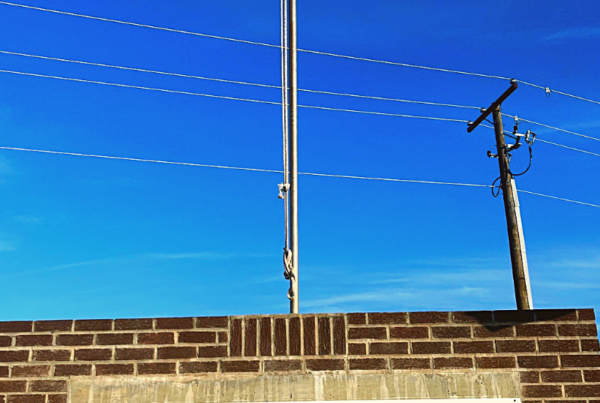BAJA CALIFORNIA, Mexico – Hidden in the sleepy depths of the undulating Mexican mountains, overlooking layers of dust and lush green, a longtime gang and cartel hitman – better known as a sicario – sits in the fading daylight. I can only refer to him as Ram, as he is one of the area’s most known and intimidating figures across both sides of the border.
“This is how it works. Someone calls someone and says they have a big problem with someone, maybe it is a guy messing with their daughter, and they will pay $2000 for a punch in the face. That person says they think they know someone who might be able to help, and it trickles down,” Ram explains matter-of-factly. “It isn’t as organized as they show in the movies.”
Nevertheless, he stresses that “even within that game, there are certain rules.”
“You leave kids out of it, and you don’t do anything that might bring heat to the neighborhood and other people,” Ram continues. “The last thing we want is for the cops to come and prompt reporters to come in. So, the idea is to do this without the attention.”
Born in New York and raised by a single mother in Brooklyn, killing has been a relatively small portion of his dark career. Most of the time, the task entails “beating the shit out of someone” or the more straightforward act of issuing threats and intimidation. In some cases, one works alone, while in other cases a team is required.
“People have this impression I am some big mafia guy,” Ram says with a shrug. “But I just happen to know people.”

With each passing year, cartel and gang violence continue to rise substantially despite decades of the Washington-initiated “War on Drugs.” The result has been carnage all over Mexico, along with extortion and kidnappings to make money and avenge crimes committed by cartels and other gangs. Moreover, Mexico’s police and justice systems have been undergoing reforms for years, but homicides still soar with over 100 killings per day in Mexico.
Yet it was Ram’s experiences running underground security operations for an alternative, psychedelic-centered rehab in South America several years ago that ultimately changed the trajectory of his life running and gunning across the East Coast. Ram still takes on nebulous “assignments,” mostly in and around the Baja California and San Diego areas, but he insists those jobs don’t involve taking lives or causing physical harm.
“Sometimes I still wind up in situations, but it’s mostly all intimidation. I have never had to physically put my hands on people in a long while, and I’m trying to get out of that life,” he notes. “Coming down here has been a lifesaver; it has helped me undo a lot of the things that I have done. I am not a real emotional guy but taking that spoon has unlocked care about other people I did not have.”
And by spoon, Ram means a spoonful of the powerful ibogaine plant medicine, a naturally occurring psychoactive substance derived from the iboga plant native to Central Africa. Deemed one hundred times more potent than its hallucinogen cousin ayahuasca, the alternative healing remedy has been used by native tribes and western neurosurgeons to treat addiction for decades. However, its anecdotal success also extends to assisting in the treatment of PTSD, depression, and anxiety, as well as transporting individuals into more intuitive and spiritual realms.
When in South America at the subterranean rehab for drug addicts, another associate insisted to Ram that it was mandatory for all those at the facility to experience an ibogaine trip.
“I wasn’t interested in taking any drugs. I’m from Brooklyn, and I remember all those dope fiends in front of my building. I thought all those drug addicts deserved to die, that they were insignificant people and don’t really matter. So, I never took any heroin; my mother always warned me I would be like the people on the street if I didn’t eat my vegetables,” Ram recounts slowly. “I always ate my vegetables.”
Nonetheless, something shifted when he started to see so many addicts – the whole portion of society the sicario had effectively “written off” – turn their own lives around after just a single ibogaine flood dose.
“The guys said I couldn’t be there unless I tried it for myself, and I told them I don’t do mind-altering stuff. I am fucked up enough, but they said just one spoon won’t kill you. I was kind of curious, so I took it,” Ram says. “I guess that is where my life changed. Here I was, someone who beat people up for a living. I did all kinds of bad things and never felt sympathy.”
Ram remembers that sunny afternoon with extraordinary attention to detail: lying down and envisioning all the vehement situations he had been in, his mind flashing back through the troves.
“I had a flashback of going up the subway stairs at Central Park, where I stabbed a guy. I remembered the hot blood falling on my hand, thinking what a strange temperature blood has, and I am feeling all the emotions, the sweat, the anxiety, and the sounds, and everything is so real,” Ram tells me quietly.
“When I did those things, I felt nothing. My mind was blank. I had forgotten. And now I am lying there vividly remembering all the shootings and stabbings and feeling all that guilt at once. I accidentally started feeling a conscience.”
Ibogaine gave Ram a sense of closure, he says, along with moving through the morbid motions of the past, and all he could do from there was move forward. The thrill once sparked by a slaying vanished instantly.
Still, Ram emphasizes that a single security project stands out among the madness and mayhem defined by his “profession” unofficially overseeing the security of the Occupy Wall Street movement during its 2011 heyday.
“I had never protested anything in my life. And yet this became the most exhilarating, empowering situation I had ever been in. Beating people up was nothing compared to this,” he adds. “Being involved in something greater made me feel so alive. It wasn’t about destroying the streets or doing violence; it was just getting people together to make a better world.”






